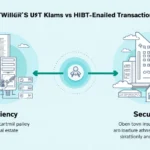Navigating Vietnam’s Blockchain Property Law: A Comprehensive Guide for Investors
With the rapid adoption of blockchain technology in various sectors, including real estate, the need for a robust legal framework has never been more critical. In Vietnam, the intersection of blockchain and property law presents both challenges and opportunities for investors. As of 2024, the Vietnamese government is actively exploring regulations that could shape the future of digital asset transactions. This article delves into the current state of Vietnam’s blockchain property law, examining existing regulations, potential developments, and practical insights that every investor needs to know.
Understanding Blockchain Property Law in Vietnam
Vietnam’s approach to blockchain technology has been both cautious and innovative. The government recognizes the potential of blockchain to revolutionize property transactions, offering transparency and efficiency. However, it has also taken a conservative stance to ensure consumer protection and mitigate risks associated with digital assets.
- Key legislation affecting blockchain in Vietnam includes the Law on Cyber Information Security and the Law on Investment.
- In 2023, Vietnam’s Ministry of Information and Communications released guidelines on blockchain applications in various sectors, highlighting the need for compliance with local laws.
- The draft law on Electronic Transactions seeks to address the legal status of blockchain transactions in property sales.
For instance, under the current framework, blockchain can enhance the efficiency of property transactions by providing secure, immutable records. However, clarity regarding the legal status of smart contracts remains a critical issue.

Key Challenges for Investors
Investing in Vietnam’s blockchain property market comes with its set of challenges:
- Lack of Clear Regulations: The evolving nature of blockchain technology means that legislation often lags behind innovation. Investors may find it challenging to navigate unclear guidelines.
- Compliance Risks: Ensuring that blockchain transactions comply with existing property laws can be complex.
- Market Volatility: Like all crypto assets, real estate tokenization can be subject to price volatility, impacting investment returns.
Understanding these challenges is crucial for making informed investment decisions.
The Future of Blockchain Property Transactions in Vietnam
As we look ahead, several trends could shape the future of blockchain property law in Vietnam:
- Government Initiatives: The Vietnamese government is actively working on a regulatory framework that supports blockchain while ensuring economic stability.
- Increased Adoption: More businesses are beginning to explore blockchain for property transactions, which could lead to new opportunities and innovations.
- Global Influence: Vietnam is observing successful blockchain implementations in other countries, which may inform its legislation.
For instance, the integration of blockchain with Vietnam’s land registration system could enhance transparency and reduce corruption in property dealings.
Practical Tips for Navigating Blockchain Property Law in Vietnam
If you’re considering investing in Vietnam’s blockchain property market, here are some practical tips:
- Stay Informed: Regularly review updates from the Vietnamese government regarding blockchain regulations.
- Consult Experts: Engage with legal experts familiar with both blockchain and Vietnamese property law to ensure compliance.
- Utilize Technology: Leverage technology tools that help evaluate blockchain properties and ensure secure transactions.
- Analyze the Market: Understand market trends and the potential for growth within Vietnam’s unique economic landscape.
Conclusion: Embracing the Future with Bitcryptodeposit
As Vietnam continues to navigate its blockchain property law landscape, investors have a unique opportunity to engage with a burgeoning market. By understanding the legal framework, addressing challenges, and staying updated on industry trends, investors can position themselves for success. The journey may be complex, but with the right resources and knowledge, it can also be rewarding.
For further insights into safe investing practices in the evolving blockchain space, consider visiting bitcryptodeposit.
Author: Dr. Linh Tran, a blockchain legal expert with over 10 years of experience in the field, has published 25 papers on blockchain regulations and led audits for various notable projects. Her work focuses on providing clarity in the rapidly evolving landscape of digital assets.








